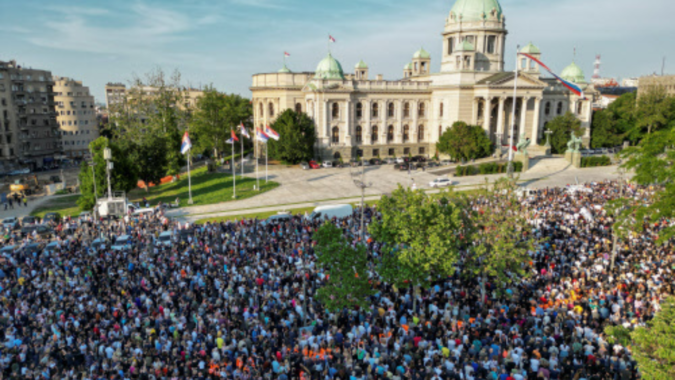BELGRADE: Tens of thousands gathered on Saturday for the fifth anti-government protest this month in Serbia‘s capital Belgrade after two back-to-back shootings that killed 18 people, half of them children.
The “Serbia against violence” protests have evolved into some of the largest rallies since widespread demonstrations triggered the fall of strongman Slobodan Milosevic over two decades ago.
The protests followed the early May mass shootings that left 18 dead and wounded several others. Nine of the dead were students at a Belgrade elementary school who were gunned down by a 13-year-old pupil.
The demonstrations have tapped into simmering anger at the ruling party over what protesters say is a culture of violence fanned by the government and the media outlets they control.
“I’m here for all of us, especially my children. So they don’t need to protest, but work and live in their country like they should,” 33-year-old mathematician Bojana Popovic told AFP during the rally.
This week’s protest, organised by several pro-European opposition parties, was initially planned for Friday but was moved as a precaution after far-right groups announced they would show up.
The demonstrators also want the government to revoke the broadcasting licences of television channels promoting violent content, and a ban on pro-government newspapers that stir tensions by targeting political dissidents.
They are also calling for the interior minister and the head of the intelligence service to resign.
The rallies were quiet at first, but transformed into a fully-fledged anti-government protest after their demands were met with fierce rebuttals from the president and his allies, who mocked the rallies and hurled insults at the participants.
Critics have for years accused Serbian President Aleksandar Vucic of increasingly relying on autocratic measures to keep opposition in disarray and media outlets and state institutions under his thumb.
Vucic dismissed the protests as a “political” stunt, and peddled conspiracy theories about foreign powers allegedly orchestrating the rallies.
The 53-year-old populist leader also shot down part of the opposition’s demand for a transitional government ahead of new elections, saying it would not happen “as long as I live”.
The “Serbia against violence” protests have evolved into some of the largest rallies since widespread demonstrations triggered the fall of strongman Slobodan Milosevic over two decades ago.
The protests followed the early May mass shootings that left 18 dead and wounded several others. Nine of the dead were students at a Belgrade elementary school who were gunned down by a 13-year-old pupil.
The demonstrations have tapped into simmering anger at the ruling party over what protesters say is a culture of violence fanned by the government and the media outlets they control.
“I’m here for all of us, especially my children. So they don’t need to protest, but work and live in their country like they should,” 33-year-old mathematician Bojana Popovic told AFP during the rally.
This week’s protest, organised by several pro-European opposition parties, was initially planned for Friday but was moved as a precaution after far-right groups announced they would show up.
The demonstrators also want the government to revoke the broadcasting licences of television channels promoting violent content, and a ban on pro-government newspapers that stir tensions by targeting political dissidents.
They are also calling for the interior minister and the head of the intelligence service to resign.
The rallies were quiet at first, but transformed into a fully-fledged anti-government protest after their demands were met with fierce rebuttals from the president and his allies, who mocked the rallies and hurled insults at the participants.
Critics have for years accused Serbian President Aleksandar Vucic of increasingly relying on autocratic measures to keep opposition in disarray and media outlets and state institutions under his thumb.
Vucic dismissed the protests as a “political” stunt, and peddled conspiracy theories about foreign powers allegedly orchestrating the rallies.
The 53-year-old populist leader also shot down part of the opposition’s demand for a transitional government ahead of new elections, saying it would not happen “as long as I live”.
